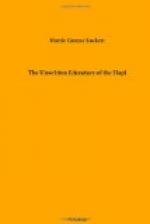Now the little turtle thought of something. So he said, ’Well, I can’t sing, so I guess you’ll have to eat me. But that’s all right, for it won’t hurt me any; here inside of my shell I’ll go right on living inside of you.’
“Now the coyote thought about this a little bit and didn’t like the idea very well.
“Then the baby turtle said, ’You can do anything you want with me, just so you don’t throw me into the river, for I don’t want to drown.’
“Now the old coyote was pretty mad and he wanted to be as mean as possible. So he just picked that baby up in his mouth and carried him over to the river and threw him in.
“Then the baby turtle was very happy; he stuck his little head out of his shell and stretched out his feet and started swimming off toward the middle of the river. And he said, ’Goodbye, Mr. Coyote, and thank you very much for bringing me back to my house so that I didn’t have to walk back.’ And the little turtle laughed at the old coyote, who got madder and madder because he had let the little turtle go. But he couldn’t get him now, so he just went home. And the baby turtle was still laughing when his mother got home, and she laughed too. And those turtles are still living in that water. (Note: Here is manifest all the subtlety of “The Tar Baby,” though generations older. H.G.L.)
=The Frog and the Locust,= as told by Guanyanum Sacknumptewa
“Qowakina was a place where Paqua, the frog, lived. One day he was sitting on a little wet ground singing a prayer for rain, for it was getting very hot and dry and that was Paqua’s way of bringing the rain, so he had a very good song like this. (Note: Here she sang a pretty little song, very rhythmic, and her body swayed gently in time to the music. It occurred to the writer that this would make a good bedtime story and the little song, a lullaby, for it went on and on with pleasing variation. H.G.L.)
“Not far away Mahu, the locust, was sitting in a bush, and he was singing too, for he was getting pretty dusty and the weather was very hot, and so he, too, was praying for rain. He has a very nice song for rain, and it goes this way. (Note: Here came a lovely little humming song whose words could not be interpreted, since they were but syllables and sounds having no meaning in English. However, these sounds had a definite order and rhythm. At this point the husband smilingly joined in the song, and the unison of both sounds and rhythm was perfect. H.G.L.)
“By and by the locust heard the frog, so he came over and asked him what he was doing. The frog said he was hot and wanted it to rain; that’s why he was singing. Then the locust said, ’Now isn’t that strange, that’s exactly what I do to make it rain, too, and that’s the best thing to do.’ So they both sang.
“Pretty soon they noticed that the clouds had been coming up while they were singing, and before long it rained, and they both were happy.




